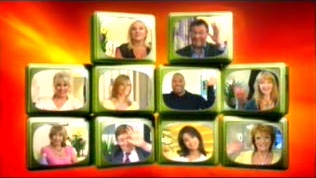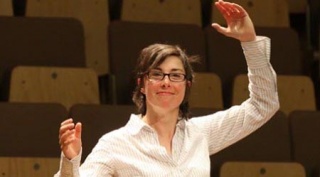Weaver's Week 2008-09-14
UKGameshows (Talk | contribs) |
m (1 revision) |
Revision as of 13:58, 22 December 2009
Last week | Weaver's Week Index | Next week
Contents |
What are you like, eh? – 14 September 2008
A quick quiz. Do you:
a) tolerate game shows if there's nothing else on
b) seek out new game shows but avoid the dull ones
c) avidly watch repeats of Gladiators starring Jeremy Guscott as a piece of wood.
What Are You Like?
Shine North for BBC2, 12 noon weekdays
A standby of print magazines is a personality quiz, telling the reader that they are, in fact, the most lovely person in the entire world, and their little habit of trying to take over the world using nothing more than the power of their mind doesn't stop them from being so lovely. Sometimes, these little quizzes are reasonably complex, asking people to score themselves against a grid at the foot. Other times, the reader is asked nothing more than to determine whether they answered mostly A, mostly B, mostly C. These little quizzes tend not to tell people anything they don't already know, but they're entertaining while the reader's doing them.
And so it is with this show. Ten minor celebs – the likes of Vanessa Feltz, Konnie Huq, and John McCririck – have been asked to fill out a ten question survey on some topics. Is Vanessa Feltz pushy? Is Konnie Huq confident? Is John McCririck loud? Is the Pope a Catholic? Trying to predict their responses are daytime television luminaries Aled Jones and Simon O'Brien, each accompanied by a team-mate (and it's our bad luck to have seen Ann Widdecombe on every episode we've sampled.) Fiona Bruce puts the little teasers out. For instance,
"You are at a karaoke night and your name is called out to perform. Do you go up and belt the song out; grab a friend and hope they're better than you; or refuse point-blank? If Esther Rantzen would do A, Tom O'Connor would do B, and Barry Cryer would do C, what would Bobby Davro do?"
 The panel is held in television sets like a modern-day Celebrity Squares
The panel is held in television sets like a modern-day Celebrity Squares
To keep the attention of the viewer, each of the little questions is introduced by an apposite clip. Sometimes, these are far more interesting than the game in hand. Actually, a lot of the time, these are far more interesting than the game in hand. This karaoke question was introduced by a clip of Breakfast Time in the Frank Bough and Selina Scott era, and Mr. Bough said it would never catch on here. If he'd been right, what would ITV have done this summer, eh?
Anyway, two questions like this for each pair. There's a subtle change for the next couple of questions: rather than ask the celebrities, the contestants must predict what the response of some people would be based only on knowledge of their profession. Are lawyers liars? Do fruit pickers keep up with current affairs? And so on. Four more clips, interspersed by four more questions.
But there's more: questions nine and ten require each team to predict how three celebrities responded. And, for the grand finale, they have to guess who had the highest score in that day's questions. Fiona ends the show by reading out what people's responses meant – if you said mostly A then the sun shines on your head, if you said mostly B then the sun shines on your hands, if you said mostly C then the sun shines on your back, and if you said mostly D then you've been taking the wrong quiz.
What is What Are You Like like? We're reminded of how Today's the Day was little more than a bunch of nostalgia clips wrapped around a quiz, and was perfectly fine for all that. While one round encourages the sort of snap decisions that were the hallmark of Judgemental, the whole show is done with an entirely good humour. That points are unimportant helps the atmosphere – with just one point per correct answer, it's common for games to be decided by football scores. It doesn't really matter whether the viewers turn out to be A, B, or C, and the players won't really mind if they've won or lost.
What Are You Like is the television equivalent of those little fillers in a magazine, entertaining enough while it lasts, but utterly immemorable later.
Mastermind
BBC Manchester for BBC2, 8pm Friday
Episode 1, 5 September
The beginning of a new series begins with a quote from Johnson: "Knowledge is of two kinds: we know about a subject, or we know where we can find information about it." Usual rules, two minutes of questions on a specialist subject nominated by the contestant, two minutes on general knowledge. The most correct answers wins, ties are broken by the fewest passes.
Ian Payn begins with the Life of Simon Raven. He was a journalist and writer in the immediate post-war era. We know little about him, which is why we include links to an appropriate and relevant website. Mr. Payn scores 12 points (with 1 pass)
Harry Bell will tell us about the History of Newcastle United since 1945. All the big names are here – Gascoigne, Milburn, and (er) Mansfield Town. Time expires, and Mr. Bell has scored 13 (2).
Jenny Dunn will discuss Edward IV, a former King of England and quondam resident of Ludlow Castle. It's going to be a close match, this contender also ends on 13 (2).
Raymond Rumkee tells us about the Life and Films of Laurence Olivier. Bonus points to the question-setters for including full details of his name in the very first question, and for including the useless fact that Thame in Oxfordshire is halfway between London and Stratford-upon-Avon. He finishes on 9 (3).
The contestants appear in ascending order of their score for the general knowledge round, so Mr. Rumkee is up first. He denies the canard that Olivier was a bit of an old ham, and – perhaps in a nod to a joke we ran late in the last series – one of the questions invites him to Name That Fruit. Mr. Rumkee ends on 18 (4).
Mr. Payn recalls the time that Mr. Raven was ill into his hat while interviewing Graeme Greene. Not from nerves, but from too much pop at lunchtime. The contender does seem to get some difficult questions, including the names of foothills of the Andes. And he gets a question about the game beginning with a throw-up. This cannot be a coincidence! 21 (3).
Mr. Bell says that his team have wasted a lot of money on players that don't fit in. He's right that it's a wonderful part of the world, though perhaps not on the night of transmission – it rained all day and all night, causing much flooding. He gets part through saying "Amelia Earhart", changes his answer to "Amy Johnson", but shuld have stuck with his instinct. He does profit from a guess on the last question, and ends on 23 (2).
Jenny Dunn tells us how Edward gained the throne, lost it, but got it back. Not by applying in person to the Lost Property Office at Baker Street, but by force of arms. The name Jeffrey Barnard is Unwell just eludes her tongue, but it doesn't really matter, she ends on 24 (5).
There'll be more Mastermind shortly.
University Challenge
Match 10: Murray Edwards Cambridge v Sheffield
We begin this match with Pronoun of the Week: "We". It's correctly answered by Sheffield. The college finished second last year, and formed in 1905 after three local institutions merged in 1897. Alumni include former minister for resignations David Blunkett, francophone comic Eddie Izzard, and aviator in "Jason" Amy Johnson. Sheffield finished second in last year's contest, and this year's captain Edward Pinney would have been on the team if he'd made the interview. Newton is scientist of the week, appearing twice in the first two sets of bonuses. The first visual round is introduced by the symbol for the International Year of the Potato. No-one knows it. Even fewer people are surprised about this. Sheffield has established a 60-0 lead.
Eventually, Sheffield gets a starter, and Thumper advises us that "we must take this seriously." The bonus questions from the visual round fall under the broad heading of Name That Spud. Even though it's barely a quarter of the way through, it looks as though one of the teams has had their chips – Sheffield knows about Shropshire, and about umbrellas, but their opponents haven't yet had a chance to show what they know.
What do they know? Ah, Murray Edwards know their physicists, answering a starter about Gibbs to universal applause. The college was formerly known as New Hall, and their performance ten years ago has gone down in history for losing with style, panache, verve, flair, and making brilliant entertainment. The institution has been renamed after founder Rosemary Murray, and benefactors Ros and Steve Edwards of computer bookings fame. The audio round follows shortly, it's on Mozart operas, and Sheffield is back on form, leading as they do by 160-15. A place in the repechage looks assured.
Murray Edwards begins the third stanza on something of a roll, getting a starter about "My favourite things" and (mercifully) resisting the invitation to sing it. Neither team is able to divide 666 by 18 correctly, which surprises us. The second visual round follows in short order, it's paintings of Shakespeare characters. Sheffield's lead is 190-50, and we're wondering if we should draw a veil over the final minutes.
Let's not, otherwise we'd miss Murray Edwards getting another starter, a minor victory for the side. Sheffield knows about various works entitled "Vanity Fair", and uses of the word "macaroni", but the match fizzles out into a run of dropped starters. Sheffield's winning score is 260-65. It's always difficult to determine a side's quality when they've so clearly outclassed their opposition in this manner; we'll just have to wait for them to return in the second round.
Jim Oliver was best on the buzzers for Sheffield, recording five correct starters; the side was correct in 24/42 bonuses. Helen Armes and Ruth Kieran both answered two starters for the Murray Edwards side, which was correct in 5/12 bonuses. There were no missignals, and every member of the Sheffield side was correct on at least one starter.
No change on the repechage board: St John's Cambridge 185 Surrey 170 Pembroke Oxford 150 Hull 140
Mastermind
Episode 2, 12 September 2008
"The quiz show that demands only the best from its contestants," says our host.
Andrew Thomson will tell us about Billy the Kid, a notorious crimefighter with his sidekick Katie. Oh, sorry, that was Billy the Cat; this round is about a notorious criminal from the Wild West in the 1870s and 1880s. It's a very good round, ending on 14 (1).
Colin Capell is already brimming with enthusiasm about his specialist subject, the Great Western Railway. It's a railway company that – originally – ran from Bristol to London, but eventually branched through the entire south-west, Wales, and Manchester. Though he starts and finishes strongly, there's a slight points failure in the middle, and a final score of 12 (1).
Sally Jones discusses the Short Stories of Saki, as written by Hector Hugh Munro. We must confess to knowing very little about these works, but they sound entirely whimsical, and the contender sells them well: 15 (2).
Stephen Porter has the Films of John Carpenter. Mr. Porter is the second teacher of the night, which says something; Mr. Carpenter's work is from the last few decades. Again, it's something about which we know little, and we're impressed with the contender's 12 (3).
Mr. Capell is first up, and discusses his work as a modern language teacher. Yes, languages are hard work, and many pupils don't receive the encouragement needed to hone their innate skills. (That seems to be a reasonable précis of his argument.) Though he gets off to a good start, his answers are as much miss as hit, and the final score of 18 (5) doesn't feel like a winner.
Mr. Porter is confronted with the argument that Carpenter has only made one film: people trapped in peril fighting for survival. It's not an argument that he rejects. He correctly recalls the operator of a dinosaur-operated crane, and guesses the origin of the Golden Delicious. He ends on 22 (6).
Mr. Thompson disputes the host's assertion that Mr. the Kid was a hoodlum – it was a society where violence was required for self-defence. It was a time when larger-than-life characters would be romanticised. Like us, he didn't know that the Swiss Cottage took its name from a pub in that shape, and ends on 23 (4).
Sally Jones is a sports reporter and former Real Tennis world champion, and tells us some anecdotes about how Anne Boleyn almost lost her head over the outcome of a match. Our contender is a journalist, and seems to have a journalist's ability to remember facts, or take a reasonable guess where she's unsure. That said, she forgets the captain of England's world cup squad last year, and rather stutters over the finishing line, scoring 25 (3).
Still, a win is a win, and – who knows – we might actually have a man win a game next week.
This Week And Next
Andrew Lloyd Webber told the BBC that he doesn't plan to bring a new casting show to air in 2009. However, we've not seen the last of him yet, for he has plans to cast The Wizard of Oz in 2010.
The annual Eurovision Dance Contest was a great night for DR's Patrick Spiegelberg and Katja Svensson, who turned some samba, a dash of tango, and a lot of jazz dance into a riveting spectacle. The Danes were disliked by the British commentary pair, so must be really brilliant. The viewing public disagreed, putting TVP's Marcin Mroczek and Edyta Herbus into pole position, with their Fantasia on Michael Jackson When He Was Famous. There were a lot of changes from last year's event – couples now perform just the once, there's a professional jury to allocate a slice of the marks, and it feels like the sort of thing Strictly Come Brucie should be aiming for. Mercifully, there are some constants: RTE sent Riverdance, the Russians an ice dancer, the Greeks wore something outrageous, Graham Norton and Claudia Winkleman annoyed, and there was an overblown interval act. The BBC's entry came ninth of the 14 competitors. Spare a thought for TROS's pair, who scraped just one point from the Austrians; and for the Swiss, as they withdrew entirely to concentrate on their football skills, only to lose 2:1 to Luxembourg.
It's also been the final week of Maestro, with Sue Perkins finishing ahead of Goldie and Jane Asher for the honour of conducting at the Proms in the Park concert. We found Tuesday's final came to a bit of a grinding halt after an hour, with the gap between Beethoven V and the result filled by increasingly desperate ideas. Still, it's been a gripping little series, and we wonder what they can possibly use to follow it next year.
Though The X Factor fell away to 8.8m, it was still the biggest game show on television in the last week of August. Last Choir Standing went out with 5.55m, but the cringeworthy lottery awards were seen by less than 4m, and were well beaten by Millionaire (4.9m). Big Brother had 3.9m for Wednesday's second show, Dragons' Den 3.6m viewers on a bank holiday Monday, and Mock the Week a season's best of 3.5m. Masterchef The Professionals debuted with 2m, Come Dine With Me 1.85m in its early-evening slot, Wogan's Perfect Recall 1.65m, but Deal or No Deal returned with just 1.6m. On Channel 5, the Superstars final was seen by 970,000, and Britain's Strongest Man by 920,000. ITV2's Xtra Factor scored a season's best, 1.4m saw the additional footage from the auditions, and just under a million the Sunday night repeat of the main show. Big Brother's Big Mouth had 580,000 on Friday night.
Three great quizzes for Monday: Brain of Brains (Radio 4, 1.30) is the challenge for the last three Brains of Britain; Get 100 (BBC1, 4.05) returns for a new series with new host Hardeep Singh Kohli; and Only Connect (BBC4, 8.30) combines knowledge and lateral thinking in a way that's right up our street. Channel 4 has a new primetime series of Come Dine with Me (8pm Wednesday) – by a complete coincidence, it's opposite BBC2's The Restaurant. Next Saturday sees the debut of Hole in the Wall (BBC1, 5.40), where Dale Winton invites BBC celebrities to pass through a moving block.
To have Weaver's Week emailed to you on publication day, receive our exclusive TV roundup of the game shows in the week ahead, and chat to other ukgameshows.com readers sign up to our Yahoo! Group.




